Ravensdale soaking up the winter sun in Maryport Marina |
The first anniversary of selling our house and moving onto a boat set us thinking about the lessons we’ve learned so far.
The whole experience has been a huge learning curve and I’m sure that will continue to be the case.
One of the main things we discovered soon after moving onto our 43ft seagoing cruiser Ravensdale is that we’ve got way too much stuff (especially me – but don’t tell Phil I said that J)
The other big one is the cost of maintaining a boat of this size.
I know there are plenty of people out there who have been doing this for much longer than us, who will have far more knowledge than we've managed to glean in our first year.
However, I hope our experiences may help others in a similar situation to us and those trying to decide whether they would enjoy life aboard.
10 lessons we’ve learned over the first year
1. You need far less stuff than you think you do
1. You need far less stuff than you think you do
 |
Sorting some of our stuff during our storage wars in the early days |
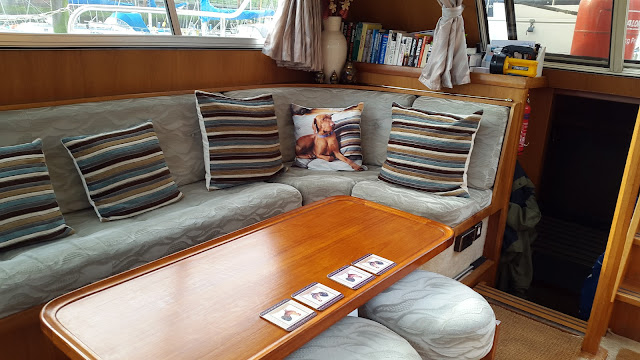 |
Everything has been tidily put away |
We got rid of most of our belongings in the fortnight between me finishing work and the sale of our house in Fort William, but we still have way too much stuff to fit on Ravensdale.
We initially rented a 75sqft shore-based storage unit, which we downsized to 50sqft and then 25sqft, the aim being to get rid of it altogether, but we haven’t managed to achieve that yet. We also have 1m3 of storage space at the marina and store our bikes in the marina bike rack.
We plan to continue reducing the amount of stuff we own until we can fit it all on the boat, except possibly the bikes. We haven’t yet decided how to deal with them.
I’m well aware that a major factor in our storage wars is my collection of clothes, coats, shoes and boots – most of which I will never wear on a boat but I can’t seem to let them go just in case...
2. Maintaining a boat will always cost far more than you expect
 |
Getting Ravensdale's two 300hp Volvo Penta engines serviced cost £1,200 |
Before we made the decision to make this life-changing move, we calculated the costs of all known expenses to make sure we could afford to do it. We included a figure for maintenance in our calculations, but we don’t mind admitting that we underestimated this figure – by a lot!
We now know you need to put aside as much as possible to pay for repairs, replacements and improvements and, most important of all, learn to do as much of it as possible yourself.
We've both done the RYA Diesel Engine Course and are hoping to be able to service Ravensdale's two 300hp Volvo Penta engines ourselves next time as paying for a professional service cost us £1,200.
3. Bigger is better where holding tanks are concerned
 |
Maryport Marina toilet and shower block |
Install the largest black water holding tank you can afford that will fit on your boat.
We discovered that our 97 litre tank fills up way too quickly if we try to use it like we would use a toilet in a house. As it happens, we wouldn't have had room for a larger one, but would certainly consider this if we ever changed our boat.
Thankfully we have good marina facilities here at Maryport in Cumbria, UK, and the walk to the loos and back is good exercise at more than 300 steps per round trip :-)
We also had a pump fitted so we can discharge the holding tank at sea.
4. Buy the most comfortable mattress you can afford
 |
Our very comfy bed with its 8in memory foam mattress |
When we first moved onboard, we were sleeping on the original mattress, which was very thin and very hard. It was only fractionally more comfortable than sleeping on the floor so we bought a new one asap.
Our new 8in custom-made CoolBlue Memory Foam mattress has been a God-send and, coupled with the rocking motion of the boat, makes for a very good night’s sleep – far better than I ever managed on dry land.
It may be OK to make do with a thinner mattress if you're only spending short periods or occasional nights aboard, but you really need a comfy bed when it’s your home.
5. Dehumidifiers are worth their weight in gold – and them some J
 |
One of our two dehumidifiers |
Boats are well known for suffering from damp problems. Living on board, which means they're kept warm most of the time, helps a lot, but they still need some extra help.
Soon after moving onto Ravensdale, we bought two dehumidifiers, each of which is supposed to be suitable for a five-bedroom house. We keep one in the aft cabin, where we sleep, and the other in the fore cabin, moving one of them into the main saloon area if we see condensation building up – for example during and after cooking.
During the summer, we used them very little as we had the windows open whenever possible. Since the weather has got colder and damper, we’re using them for short periods night and morning on most days.
During the summer, we used them very little as we had the windows open whenever possible. Since the weather has got colder and damper, we’re using them for short periods night and morning on most days.
When it gets really cold and damp, we leave one dehumidifier on a very low setting in the fore cabin overnight with all the doors open and this seems to keep the boat dry.
6. Pay a regular sum of money into a diesel fund
 |
A diesel fund is a must - particularly for cruiser owners |
We set up a bank account specifically for this purpose and a standing order to transfer money into it from our current account soon after we moved onboard.
The idea being to ensure there would always money available for fuel for both heating and propulsion as and when it was needed - and it has served us well.
Right from the start, we decided that it was fine not to travel if it was our choice to stay put, but we didn’t want to get to a point where we wanted to go somewhere and couldn’t afford the fuel to make the trip.
7. Learn as much as you can about your boat
 |
Phil and Bay Sea School instructor John Parlane during our diesel engine course |
You also need to learn as much as possible about navigating if you’re planning to go anywhere on your boat.
We both took the RYA Day Skipper and Yachtmaster Offshore theory courses and the RYA Diesel Engine Course.
We also both gained our VHF radio Short Range Certificate.
We also both gained our VHF radio Short Range Certificate.
8. Use the marina showers whenever possible
 |
The ladies shower and toilet facilities at Maryport Marina |
We have a perfectly good shower on Ravensdale. It's en suite to our bedroom, separate from the heads and larger than many boat showers with a good flow of water.
However, using it in cold and/or damp weather tends to make it more difficult to keep the boat dry.
We've found the best solution for us to be using the onboard shower in the summer when it's easier to dry properly and the marina facilities are busier. Since the weather has started to change for the winter, we've gone back to using the now quieter marina showers.
Fortunately our marina has really good showering facilities. The shower and toilet block is lovely and warm and we can use as much hot water as we want – compared to onboard showers when we try to restrict the amount of hot water we use as much as possible.
9. You don’t need to own a washing machine
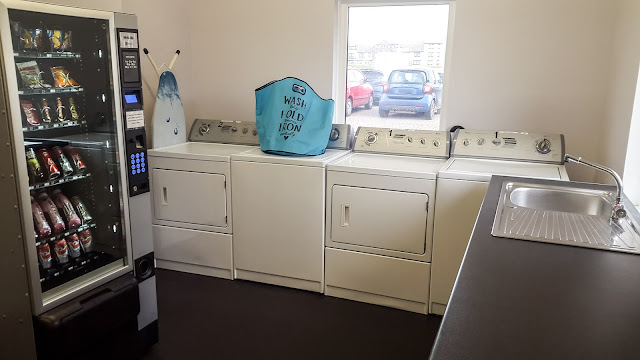 |
Wash day at Maryport Marina laundry |
Before we moved onboard, I rather stupidly thought I would miss having our own washing machine, but I don’t – not at all.
That said, I'm well aware that the situation would be very different for anyone who is not marina-based or whose marina doesn’t have a good launderette.
Here, I take a load of washing up to the marina’s laundry room once a week, where I wash and dry the week’s washing for just £5.40. This includes an extra high spin before putting it into the tumble dryer. Our clothes, towels, bedding, etc. all come out lovely and dry ready to be folded up and put away.
10. We don’t miss our dishwasher
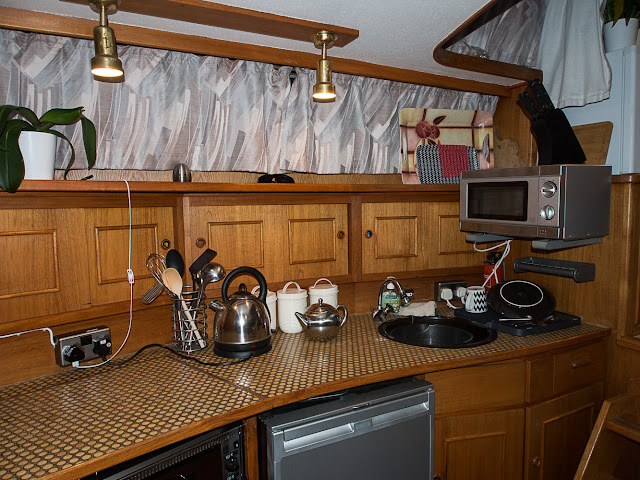 |
Washing up in Ravensdale's galley |
I really can’t believe I even thought I'd miss our dishwasher, but we’d had one for many years and had got use to using it.
Anyway, we don’t miss it at all, to the extent that I would almost say I can’t see the point of having one, unless you have a large family or do a lot of entertaining, neither of which was true in our case.
Living on a boat, which invariably means the galley is much smaller than most kitchens ashore, makes it a no-brainer to wash up as you go along during food preparation and immediately after meals.
And one for luck...
11. Consider dropping a few pounds (or stones in my case) J
11. Consider dropping a few pounds (or stones in my case) J
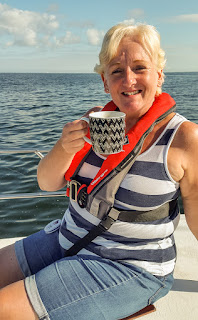 |
Me enjoying a cup of tea at sea |
Don’t get me wrong, I’m perfectly happy living in a relatively confined space. However, if there was a bit less of me, I would have more room to move around.
The past week
 |
Here's to many more happy years on Ravensdale |
We drank a toast to Ravensdale on Saturday evening to mark our first anniversary as liveaboards and celebrated in true British fashion with a delicious fish and chip supper J
And we've bought her an early Christmas present – two new 180 ampere hour starter batteries – after discovering that the existing ones were finished.
 |
Ravensdale's new starter batteries |
We’re still enjoying our new berth and have been getting a bit of winter sun here.
It’s also interesting to see some of the bigger boats passing Ravensdale on their way to the marina slipway and the MPM boatyard next to the marina.
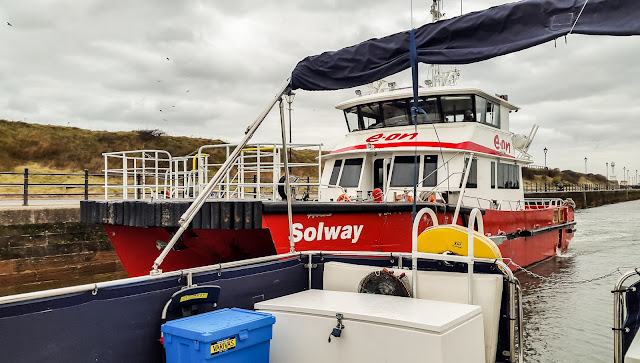 |
Close encounters - Solway Challenger heading for the marina slipway |
 |
The RV Susan H passes Ravensdale on her way back from the slipway |
Other than that, this week seems to have disappeared into thin air.
We seem to have spent a good bit of our time socialising, on and off the boat, or out walking, taking photos and, in Phil’s case, fishing.
I’ve hardly found any time to get on with the novel I'm trying to write, but hoping to catch up on that a bit next week.
On Saturday morning, we decided to look into the possibility of booking an organised fishing trip as we have no real idea where to fish from our boat in the Solway Firth.
While trying to find out who best to speak to about this, we had a chance encounter with a marine electrician, who was about to do some work on another berth holder’s boat.
He agreed to come and take a look at the electrics on Ravensdale and spent the best part of three hours on Saturday afternoon replacing all the connections on the battery terminals.
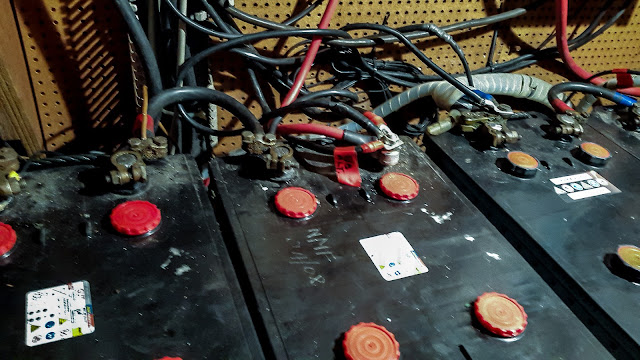 |
The new connections on Ravensdale's battery bank |
He also discovered that the alternators on both engines were connected to one battery and split them so that there is now one connected to each battery.
And he’s going to return to carry out some further work for us in the near future.
We also managed to sort the fishing trip by joining a local fishing club and we hope to go out on the club’s boat very soon.
Meanwhile, Phil has been trying his hand at fishing off Maryport pier while I wandered around taking photos and chatting with anyone who would talk to me J
 |
Phil fishing on the pier at Maryport |
Sadly, Phil didn’t manage to catch our supper – just a couple of very small fish that were thrown back.
However, one of the other fishermen we met on an earlier walk on the pier was delighted to catch his first cod of the season.
I asked if I could take a photo and he happily posed with his catch.
While I was taking a couple of shots, the fish managed to wriggle free and made a bid for freedom, which I was really pleased to have accidentally captured on camera, complete with the shadow of the flying fish.
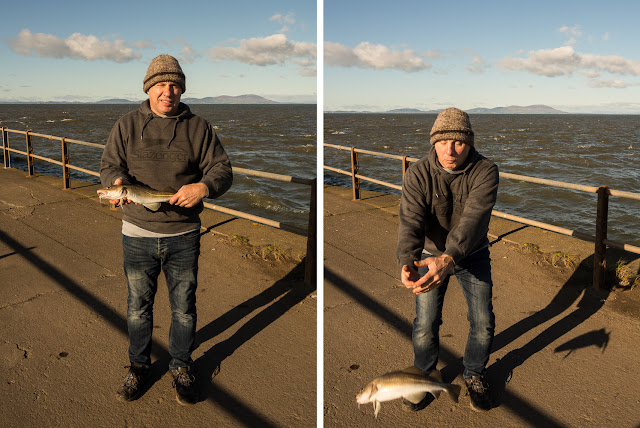 |
The one that got away |
Almost every time we go out, I return with a whole heap of photos. I really must go through them and delete all but the best asap.
Phil, on the other hand, only takes occasional photos, which invariably turn out to be so much better than mine, or so he says J
 |
Ravensdale at night by Phil Restan |
 |
Swans in the marina by Phil Restan |
He calls me a “machine gun photographer”, which I guess is fair comment, and to prove it below are some or the many images I’ve taken this week.
 |
A juvenile cormorant in the marina |
 |
Maryport Marina on a sunny November day |
 |
The ramp down onto the pontoons at Maryport Marina |
 |
Another view of Maryport Marina |
 |
A berth holder and friend at sea |
 |
Maryport Lighthouse at sunset |
 |
Evening light on Maryport Harbour |
 |
Fishermen on Maryport pier |
 |
Iggesund Paper Mill at Workington |
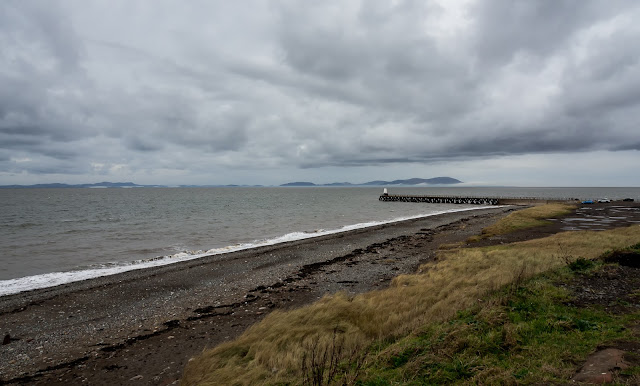 |
Grasslot Shore at Maryport |
